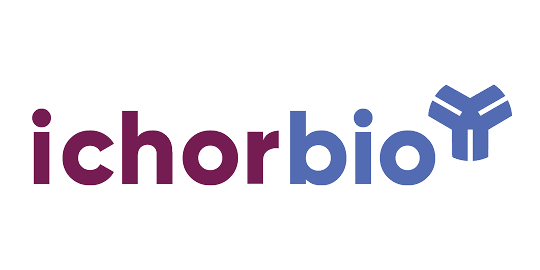Anti-Mouse CD105 (MJ7/18) In Vivo Antibody- Ultra-Low Endotoxin
Anti-Mouse CD105 (MJ7/18) In Vivo Antibody- Ultra-Low Endotoxin, Host: Rat, Rat IgG2a Kappa
Artikelnummer
ICH1191UL-5MG
Verpackungseinheit
5mg
Hersteller
Ichorbio
Verfügbarkeit:
wird geladen...
Preis wird geladen...
Target: CD105
Clone: MJ7/18
Specificity: MJ7/18 activity is directed against mouse CD105 (endoglin).
Purification method: This monoclonal antibody was purified using Protein G
Antigen Distribution: CD105 is alternatively spliced, resulting in both long (L-endoglin) and short (S-endoglin) forms. The predominant isoform, L-endoglin, promotes the proliferation and migration of endothelial cells via enhanced ALK1-Smad1/5 signaling and is the presumed isoform when not specified in the literature. In contrast, S-endoglin enhances ALK5-Smad2/3 signaling. Endoglin has specific receptor-ligand interactions between type I and type II TGF-β superfamily receptors when binding TGF-β superfamily ligands. Mouse CD105 has three separate regions of similarity to TGF-β receptor III but does not contain the RGD tripeptide found in human CD105.
Background: CD105 (endoglin) is a TGF-β superfamily co-receptor that promotes angiogenesis, is involved in endothelial integrin-mediated mural cell and leukocyte adhesion, antagonizes TGF-β mediated ERK activation, is essential to the immune response of macrophages, regulates trophoblast differentiation and invasion during pregnancy, promotes T-cell proliferation, and regulates differentiation and collagen expression in myofibroblasts
Immunogen: MJ7/18 was produced by immunizing rats with inflamed mouse skin and selecting for reactivity with endothelial cells. MJ7/18 predominantly stains vascular endothelial cells and is a marker of mouse endothelium
Concentration: ≥ 2.0 mg/ml
Formulation: Sterile, preservative-free, solution in PBS. BSA and Azide free.
Purity: >98% by SDS-PAGE and HPLC
Endotoxin: ≤ 0.5 EU/mg as determined by the LAL method
Aggregation: Aggregation level ≤ 1%
Use: Products are for research use only. Not for use in diagnostic or therapeutic procedures.
Clone: MJ7/18
Specificity: MJ7/18 activity is directed against mouse CD105 (endoglin).
Purification method: This monoclonal antibody was purified using Protein G
Antigen Distribution: CD105 is alternatively spliced, resulting in both long (L-endoglin) and short (S-endoglin) forms. The predominant isoform, L-endoglin, promotes the proliferation and migration of endothelial cells via enhanced ALK1-Smad1/5 signaling and is the presumed isoform when not specified in the literature. In contrast, S-endoglin enhances ALK5-Smad2/3 signaling. Endoglin has specific receptor-ligand interactions between type I and type II TGF-β superfamily receptors when binding TGF-β superfamily ligands. Mouse CD105 has three separate regions of similarity to TGF-β receptor III but does not contain the RGD tripeptide found in human CD105.
Background: CD105 (endoglin) is a TGF-β superfamily co-receptor that promotes angiogenesis, is involved in endothelial integrin-mediated mural cell and leukocyte adhesion, antagonizes TGF-β mediated ERK activation, is essential to the immune response of macrophages, regulates trophoblast differentiation and invasion during pregnancy, promotes T-cell proliferation, and regulates differentiation and collagen expression in myofibroblasts
Immunogen: MJ7/18 was produced by immunizing rats with inflamed mouse skin and selecting for reactivity with endothelial cells. MJ7/18 predominantly stains vascular endothelial cells and is a marker of mouse endothelium
Concentration: ≥ 2.0 mg/ml
Formulation: Sterile, preservative-free, solution in PBS. BSA and Azide free.
Purity: >98% by SDS-PAGE and HPLC
Endotoxin: ≤ 0.5 EU/mg as determined by the LAL method
Aggregation: Aggregation level ≤ 1%
Use: Products are for research use only. Not for use in diagnostic or therapeutic procedures.
| Artikelnummer | ICH1191UL-5MG |
|---|---|
| Hersteller | Ichorbio |
| Hersteller Artikelnummer | ICH1191UL-5MG |
| Verpackungseinheit | 5mg |
| Mengeneinheit | STK |
| Reaktivität | Mouse (Murine) |
| Klonalität | Monoclonal |
| Methode | Immunofluorescence, Immunoprecipitation, Western Blotting, ELISA, Flow Cytometry, Immunohistochemistry, Live Cell Imaging, Fluorescence-Activated Cell Sorting (FACS) |
| Isotyp | Rat IgG2a kappa |
| Wirt | Rat |
| Produktinformation (PDF) | Download |
| MSDS (PDF) | Download |

 English
English







